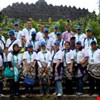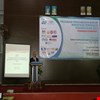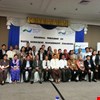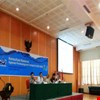


26 lecturers from Indonesian universities recently met in Yogyakarta, Indonesia, together with GWP representatives for a workshop on Integrated Water Resources Management (IWRM) ToolBox.

26 lecturers from Indonesian universities recently met in Yogyakarta, Indonesia, together with GWP representatives for a workshop on Integrated Water Resources Management (IWRM) ToolBox.
One of our partners, The Network of Asian River Basin Organizations (NARBO), held its 8th IWRM Training in Thulhiriya, SriLanka from 27 November-4 December 2013 to be hosted by Mahaweli Authority of Sri Lanka (MASL). The Training theme is "Enhanced Water Security through IWRM - Mahaweli Experience".
The eight days training program used a mix of participatory and trans-disciplinary case studies which aims to develop the capacity of participants in IWRM Implementation by using the "IWRM Spiral Model" which was introduced as part of the "IWRM Guidelines at River Basin Level" and issued by UNESCO in 2009. 27 Participants from 11 countries includes: Lao PDR, Thailand, Malaysia, Indonesia, Philippines, India, Nepal, Bangladesh, Pakistan, Afghanistan and Sri Lanka.
On 18 December 2013, Indonesia Water Partnership re-introduced Tool Box to 14 participants who came from Government, Professional, University, and NGO. Resource Persons came from: Government (DG Water Resources, Ministriof Public Work); Private Companies, NGOs, Highe Education (University). Indonesia Water Partnership (INA-WP) as an organizer and Co-organizer was Directorate of Water Resources, Ministry of Public Work, Republic of Indonesia. Inkind support received are meeting room, sound system and LCD
“We are trying to bring more people to write and share their result of hard work in to article and share it with other people by using Tool Box” Dr. Melati Ferianita , Indonesia Water Partnership.
As an anticipation of drought problems, Indonesia Water Partnership held a dialogue with Local community on drought in a Meeting Room of Ministry of Public Work in Jakarta, Indonesia on 11 December 2013.
Indonesia is a country with two season, dry season and rainy season. During the dry season, drought has been a problem for society, industry and agriculture. There is not enough water to drink, cleaning, and washing for society. For farmers, it can be crop failure, late harvesting which make farmers lost their fund and start cropping from beginning. And for industry, there is also not enough water to run the business.

Following the successful implementation of the National Integrated Flood Management (IFM) Programme - Role of Community 2012 last year in Kuala Lumpur, which was attended by participants from the states of Selangor, Negeri Sembilan, Melaka and Johor, the same programme was again planned for this year, but held only at the State of Pahang on 7th September 2013.
The 2013 event, aimed at raising awareness and disseminating information to communities living in flood-proned areas in the State of Pahang, was organised by the Department of Irrigation and Drainage (DID) Malaysia and MyWP Capacity Building Network (MyCBNet) in collaboration with Malaysian Water Partnership (MyWP) and MyCWP.

Nine countries of Southeast Asia sit together in a workshop to share and discussed about water financing in region.This workshop took place in Yangon, Myanmar on 3rd October 2013.
The goals of the workshop are to understand the financing frameworks for water resources management and development, to generate information regarding the level of public investments for WRM initiatives, and to propose potential financing schemes and mechanisms to increase the level of WRM financing.

There have been many dialogues and seminars on river pollution in the past 20 years or so. Generally everyone agrees that as a country, we desperately need to do something about the sad state of our rivers, especially when we hope to achieve developed nation status by 2020. However, we have not been successful in translating consensus at these forums into changes on the ground.

Many dialogues and seminars on river pollution have been organised over the past 20 years. Generally there is an agreement that countries desperately need to do something about the sad state of rivers, especially in countries which hope to achieve developed nation status by 2020.

As an implementation of cooperation between GWP and UNDP, Indonesia Water Partnership held a National Consultations on Water in Post-2015 Development Agenda on 4 March 2013 in Ministry of Public Work Building, Jakarta .
The thematic consultation was focused on water have three defined subsets for water: (1) Water, Sanitation and Hygiene (WASH), (2) Wastewater/Water Quality (WW/Q) and (3) Water Resources Management (WRM).